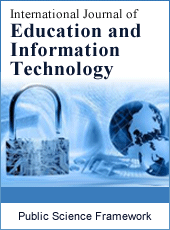International Journal of Education and Information Technology
Articles Information
International Journal of Education and Information Technology, Vol.3, No.1, Mar. 2018, Pub. Date: May 28, 2018
A Personalized Intervention Program to a Child with Asperger Syndrome Addicted to Computer Gaming
Pages: 1-6 Views: 2354 Downloads: 682
[01]
Ekaterini Stavrou, Faculty of Education, University of Ioannina, Ioannina, Eriprus, Greece.
According to the international literature, it is an indisputable fact that some children result in addiction to virtual reality and certainly to dangerous ramifications by the unhindered use of the internet or electronic gaming. Our individualized educational intervention is a behavioural type program and it lasted intensively for three consecutive years. Its aim is to improve the child’s social-emotional condition, through early removal of the video games and the internet. Our research is a case study of a high-functioning autistic child (Syndrome Asperger), who was depended on electronic game. The methodology was based on the “method of gradual replacement” of the time the child-subject of the research dedicate on role-playing games with role plays through constructive narrative intervention. The result of our research shows that the child was developing his self- confidence, and he also discovered himself gradually and was liberated by his dependence. To sum up, the invaluable tools should be adopted as well as the educational methods in Special Education so that any dependence is prevented.
Syndrome Asperger, Individualized Educational Program, Narrative Intervention, Electronic Games Removal
[01]
American Psychiatric Association (2013). DSM-V Diagnostic and Statistical Manual of Mental Disorders, Fifth Edition. ISBN 978-0-89042-554-1.
[02]
Amstrong et al. (2000). Potential determinants of heavier Internet usage. International Journal of Human Computer Studies 53, 537-550.
[03]
Arntz, A. (2006). Pathological dependency: Distinguishing functional from emotional dependency. Clinical Psychology Science and Practice 12 (4): 411 - 416.
[04]
Cooper, J. C. (1983). The wonderful world of fairy tales: allegories of the inner life, the road to maturity. Athens, Thimari: 21.
[05]
Dill, K., Dill, C. (1998). Video game violence: A review of the empirical literature. Aggression and Violent Behavior, 4 (3): 407–428.
[06]
Ekeland et al. (2004). Exercise to improve self-esteem in children and young people. Cochrane Database of Systematic Reviews (1).
[07]
Fisher, S. (1994). Identifying video game addiction in children and adolescents. Pub Med National Library of Medicine National Institutes of Health. 19 (5): 545-53.
[08]
Gentile, D., Lynch, P., Linder, J., Walsh, D. (2004). The effects of violent video game habits on adolescent hostility, aggressive behaviors, and school performance. Journal of Adolescence 27: 5–22.
[09]
Greimas, Al. (2005). Cust.: Kapsomenos, Er., trans.: Parisis, C. Structural semantics. Search method. Athens: Patakis: 341-390.
[10]
Huston AC, Donnerstein E, Fairchild H et al. (1992), Big World, Small Screen: The Role of Television in American Society. Lincoln, Neb.: University of Nebraska Press.
[11]
Jung, C. (1980). Man and his symbols. Athens: Arsenidis.
[12]
Kim, E., Namkoong, K., Taeyun, Kim, S. (2008). The relationship between online game additiction and aggression, self –control and narcissistic personality traits. Pub Med National Library of Medicine National Institutes of Health, 23 (3): 212-8.
[13]
Krueger, A. (1993). How computers have changed the wage structure: Evidence from micro data, 1984-1989. The Quarterly Journal of Economics, 108, (1): 33-61.
[14]
Lacan, J. (1948) L’ aggressiviteʹ en psychanalyse in ʹEcrits (1966). Paris, Seuil.
[15]
Loy D, Dattilo J. (2000). Effects of different play structures on social interactions between a boy with Asperger's Syndrome and his peers. Therapeutic Recreation Journal, 34 (3): 95.
[16]
Марина Жукова, Елена Фролова, Ксения Шишкина (2012) Prevention of dependence on computer games among primary school children. General and Professional Education, pp. 61-70. ISSN 2084-1469.
[17]
Makri -Botsari, E. (2001). Self-concept and self-esteem. Models, development, functional role and evaluation. Athens: Greek Letters.
[18]
Ministry of Education of Greece- EDUCATION INSTITUTE (2009) Analytical learning disabilities programs. Information-Awareness.
[19]
Papageorgiou, B. (2001) Children and Adolescents - Mental Health Problems. University Studio Press. ISBN: 960-12-0949-2.
[20]
Papanoutsos, E. (1980). Fairytale. Ephemera, current, outdated. Athens: Ikaros: 118-9.
[21]
Phillips, C., Rolls, S., Rouse, A., Griffiths, M. (1995). Home video game playing in schoolchildren: a study of incidence and patterns of play. Journal of Adolescence; London 18.6 : 687.
[22]
Poon, A. (2012). Computer game addiction and emotional dependence. Senior Theses, Trinity College, Hartford, CT 2012. Trinity College Digital Repository. http://digitalrepository.trincoll.edu/theses/253.
[23]
Propp, Vl. (1991). Morphology of the story. The controversy with Claude Levi- Strauss and other texts. (Trans. Parisi, Nr.) Athens: Institute of the book. M. Kardamitsa.
[24]
Stavrou, Ek. (2012). The popular literature and its contribution to the treatment and education of children with disabilities and special educational needs, pp. 36, 431. PhD Thesis, ECB http://hdl.handle.net/10442/hedi/28463 (DOI 10.12681 / eadd / 28463).
[25]
Truglio, Murphy, Oppenheimer, Huston & Wright (1996). Predictors of childrens’s entertainment television viewing: Why are they tuning in? Journal of Applied Developmental Psychology 17: 475-494.
[26]
World Health Organization-WHO. Dependence syndrome http://www.who.int/substance_abuse/terminology/definition1/en/

ISSN Print: 2381-7410
ISSN Online: 2381-7429
Current Issue:
Vol. 5, Issue 1, March Submit a Manuscript Join Editorial Board Join Reviewer Team
ISSN Online: 2381-7429
Current Issue:
Vol. 5, Issue 1, March Submit a Manuscript Join Editorial Board Join Reviewer Team
| About This Journal |
| All Issues |
| Open Access |
| Indexing |
| Payment Information |
| Author Guidelines |
| Review Process |
| Publication Ethics |
| Editorial Board |
| Peer Reviewers |


